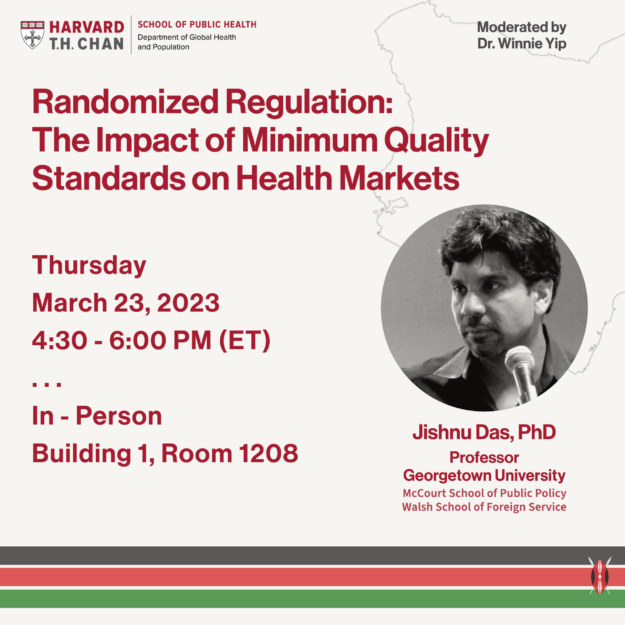“Randomized Regulation: The Impact of Minimum Quality Standards on Health Markets”
Join us for a seminar featuring Dr. Jishnu Das, Professor at the McCourt School of Public Policy and the Walsh School of Foreign Service at Georgetown University. Moderated by Dr. Winnie Yip, Professor of Global Health Policy and Economics, Harvard T.H. Chan School of Public Health.
Thursday, March 23
4:30 – 6:00 PM (ET)
In – Person
Building 1, Room 1208
Abstract
We report results from the first randomization of a regulatory reform in the health sector. The reform established minimum quality standards for patient safety, an issue that has become increasingly salient following the Ebola and COVID-19 epidemics. In our experiment, all 1348 health facilities in three Kenyan counties were classified into 273 markets, and the markets were then randomly allocated to treatment and control groups. Government inspectors visited health facilities and, depending on the results of their inspection, recommended closure or a timeline for improvements. The intervention increased compliance with patient safety measures in both public and private facilities (more so in the latter) and reallocated patients from private to public facilities without increasing out-of-pocket payments or decreasing facility use. In treated markets, improvements were equally marked throughout the quality distribution, consistent with a simple model of vertical differentiation in oligopolies. Our paper thus establishes the use of experimental techniques to study regulatory reforms and, in doing so, shows that minimum standards can improve quality across the board without adversely affecting utilization.
Biography
Jishnu Das is a Professor at the McCourt School of Public Policy and the Walsh School of Foreign Service at Georgetown University. Jishnu’s work focuses on health and education in low and middle-income countries, with an emphasis on social markets, or common, but complex, conflagrations of public and private education and health providers operating in a small geographical space.
As part of this research, he has co-developed the largest and longest-running cohort study on learning outcomes in low-income countries and has led an agenda on the measurement of healthcare quality in low-income countries. The methods he has developed are now being used by The World Bank in its Service Delivery Indicators as well as by multiple research groups in in India, Indonesia, South Africa, Kenya, Senegal and Tanzania. His research has shown how government can use information, funding and training programs to improve service delivery for the poor. His evaluations with multiple co-authors has led to the widespread adoption of a training program for informal providers (in West Bengal), health facility inspections (in Kenya) and networks for private sector providers (in India). He was also part of the team that developed India’s federal inpatient health insurance scheme, the RSBY, which reached 150 million people in 2016. Dr. Das has received the George Bereday Award from the Comparative and International Education Society, the Stockholm Challenge Award for the best ICT project in the public administration category in 2006, and the Research Academy award from the World Bank in 2017 and 2013 for research on health and education.
